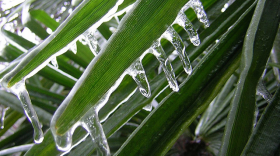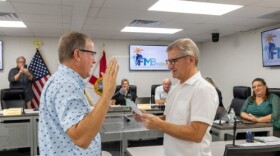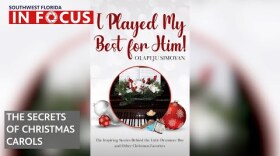The StoryCorps Mobile Tour returned to Fort Myers in February 2024 to record meaningful conversations with people right here in Southwest Florida about their lives.
Each Monday for the next several months, we’re highlighting some of the compelling stories from our fellow Southwest Florida residents.
In this installment, we hear Sunny Lubner interview her good friend Stephanie Davis about her childhood in Southwest Florida, including the stigma of having a lesbian mother, trouble with school, and a daring escape attempt from a wilderness camp for troubled girls.
TRANSCRIPT:
JOHN DAVIS, HOST: From WGCU News, I'm John Davis. Each Monday, we're featuring conversations recorded through the StoryCorps mobile tour stop in Fort Myers earlier this year. Today, we hear Sunny Lubner interview her friend Stephanie Davis about Davis's somewhat unconventional childhood, including an escape from a wilderness camp for troubled girls.
SUNNY LUBNER: What did you want to be growing up?
STEPHANIE DAVIS: I have two things I wanted to be. I either wanted to be a very famous movie actress.
LUBNER: Yeah.
DAVIS: Very famous. I didn't want to be like an actress on a TV series or stage. I wanted to be an Oscar winning movie actress. But the other thing I loved was journalism. And I loved writing. I loved interviewing subjects. It fascinates me. It's my thing. I'm a great listener, and I do tend to not talk about myself very much because I have such a curiosity about other people. So I'm lucky, because I got to grow up and be a journalist.
LUBNER: Where did you grow up?
DAVIS: My younger years were in a tiny, little town in Ohio. When I was about 10 or 11 years old, my mother and my father divorced because my mother met a woman, and in the late 1970s that was weird. That wasn't like now it's kind of cool, you know, if your parents are gay, but back then, it wasn't so cool. And so we moved to Fort Myers, because my mother always wanted to be in the sun. And I remember walking around Fort Myers and going, where are the trees? Where are the hills? Where are the farms? Where are the horses? And it was just this desolate, hot, hot world. It was so hot, I couldn't breathe. I was so miserable.
LUBNER: So where did you go to school?
DAVIS: I went to middle school in Fort Myers, and I didn't attend high school. I started to. I went into ninth grade, and I really didn't enjoy school for various reasons. One: I was very interested in theater. I was also interested in media. I was interested in radios. The school that I went to, Cypress Lake High School here in Fort Myers, didn't have any of those things. And of course, the ironic thing now is that now Cypress Lake High School, 152 years later, which I'm exaggerating on the time, is now the Center for the Arts. Back then, it was a sports school, and I didn't fit in at all. And then when some of the kids that I went to school with found out that my mother lived with another woman and slept in the same bed as another woman, I had a girlfriend come over to my house one time, and she said, “Well, I see your room and I see your mom's room.” She said, “Where does your mom's roommate Linda sleep?” And I said, “Well, she sleeps there with mom in that queen size bed.” And she went, “Oh, well, then your mom's a lezzie.” And I was like, “shoot, well, I suppose, I guess I”, you know. And then she went to school the next day and told everybody that my mom was a lezzie. And so, with my mom being a lesbian, by the way, that makes you, by proxy, when you're 12-13, years old, it makes you a lezzie as well. So, I was not enjoying being teased all the time. So I just stopped going to school altogether. I would take the bus to the library, and I would read plays, and I would read books, and I just sort of educated myself all at all.
LUBNER: And then what happened?
DAVIS: Well, apparently it's frowned upon to be a 12-13, year old girl and not go to school. And so I was suspended a number of times, and finally they expelled me. And when they expelled me, I was 15, going on 16, and my mother really just didn't know what to do with me at that point, and I went to what I now call jokingly, bad girls camp. It was the Eckerd Wilderness Education Program. I lived there with a lot of other girls my age, who were quote - unquote “troubled,” if you will. And we lived in tents in the woods for about two years. We had no radio, no TV, no newspaper. Culture Shock wise, for a kid like me, it was very difficult. After the first day, second day, I decided I didn't like it, and I decided that I just was going to have to pursue becoming an actress. And so I waited until about three o'clock in the morning. So I laid there until everybody went to sleep in the tent. The only shoes we had that they gave us were combat boots, and I did not want to wear combat boots. The whole idea was I was going to hitchhike to the interstate, and then I was going to hitchhike up the interstate to New York City. And then when I got to New York City, I was going to audition for various Broadway plays, and I was going to be hired and then I would be hired for film, and then I would be an Oscar winning actress, right? So, but I couldn't do that in combat boots. So I left barefoot, which was a real problem because the camp was about five miles in from a rural highway, and I couldn't feel my feet after a while. I just kept going and kept going. I'm in the swamps of Florida. There's alligators, there's snakes, there's mosquitoes, there's bad men, there's all kinds of things. And I was just like, “No, I gotta go.” But the first thing I really needed when I finally got to where I saw lights, I saw a convenience store, and it was probably at this point, it's got to be about 6:30 in the morning. People are going to work and that sort of thing. And so I went up to the convenience store, and I really needed a cigarette, so I panhandled. Here I am. I'm a 15 year old girl in jeans, no shoes, and I'm like, “Can I have a dime? Can I have a nickel? Can I have a cigarette?” Whatever. I finally got enough money to buy a generic pack of cigarettes. So now I just need to go find the interstate, and then we can get on our way. But as I was doing that, a police car pulled up, and he took one look at my feet. They were bloodied, they were blistered, they were ruined. I didn't care, and he looked down, and he said, “You forgot your combat boots. We're taking you back to camp.” And so he put me in the back of the car, and I went back to camp, and I did my time, and so we both had a weird time in the late 70s, and we didn't even know each other. I wish we had.
LUBNER: I would have sprung you.
DAVIS: I absolutely know that you would have.
JOHN DAVIS: That was Stephanie Davis being interviewed by her good friend Sonny Lubner. Their conversation was recorded in Fort Myers through the StoryCorps mobile tour. This is WGCU News.
WGCU is your trusted source for news and information in Southwest Florida. We are a nonprofit public service, and your support is more critical than ever. Keep public media strong and donate now. Thank you.








